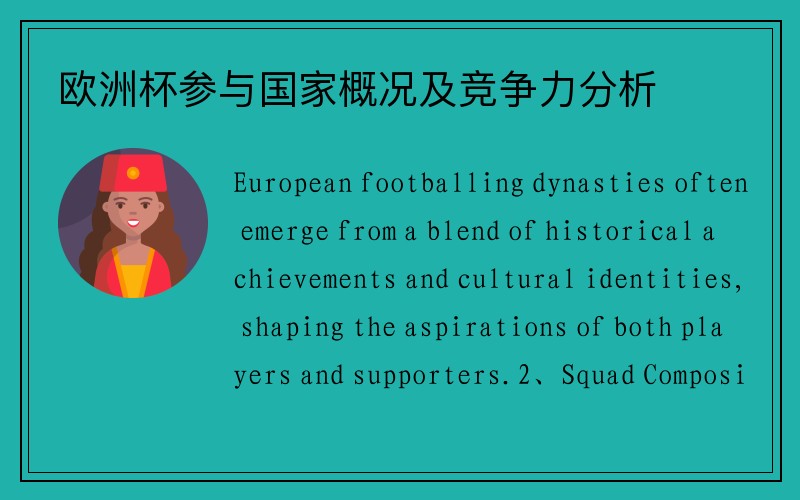欧洲杯参与国家概况及竞争力分析
**Article Abstract:**
The UEFA European Championship, commonly known as the Euro, serves as a pinnacle for European football nations to showcase their prowess and competitive spirit. This article delves into an analysis of participating countries, focusing on their national football profiles and competitive strengths. It explores factors such as historical performance, squad composition, tactical strategies, and current form to assess their competitive edge on the Euro stage.
1、National Football History
Europe's footballing landscape is rich with history, each nation weaving its unique narrative of triumphs and setbacks. Historical context shapes current perceptions and expectations, influencing team strategies and fan sentiments. This section delves into how a nation's footballing history influences its approach and mentality in the Euro.

From legendary victories to enduring rivalries, national football history often mirrors broader cultural narratives, impacting team cohesion and player motivation.
Strategic investments in youth development and infrastructure highlight a nation's commitment to long-term success in international competitions.
European footballing dynasties often emerge from a blend of historical achievements and cultural identities, shaping the aspirations of both players and supporters.
2、Squad Composition and Depth
The composition of a national squad reflects its depth and versatility, crucial in navigating the rigorous Euro tournament schedule. This section analyzes how player selection strategies and managerial decisions impact squad dynamics and tactical flexibility.
Key players and emerging talents contribute to squad depth, providing crucial options for tactical adaptations and game-changing moments.
bat365在线平台Strategic squad rotations and injury management strategies underline a team's preparedness and resilience throughout the tournament.
3、Tactical Adaptability
Tactical acumen plays a pivotal role in determining a team's success in the Euro. This section examines how tactical innovations and strategic flexibility influence match outcomes and tournament progression.
From defensive solidity to attacking flair, tactical frameworks define a team's approach against varying opponents and situations.
Adaptability in formations and playing styles reflects a team's readiness to exploit weaknesses and capitalize on strengths across different stages of the competition.
Coaching philosophies and tactical innovations often define a nation's approach, showcasing the evolution of football strategies in response to modern challenges.
4、Current Form and Momentum
Current form serves as a barometer of a team's readiness and competitive momentum heading into the Euro. This section evaluates how recent performances and tournament preparations influence team morale and expectations.
Pre-tournament friendlies and qualifying campaigns offer insights into a team's cohesion and tactical adjustments under competitive conditions.
Injuries, suspensions, and squad disruptions can impact a team's form, necessitating managerial strategies to maintain momentum and morale.
Team dynamics and player psychology often converge in the crucible of the Euro, where current form can either validate or challenge pre-tournament expectations.
总结:
As the Euro unfolds, national football profiles and competitive strengths come to the forefront, shaped by historical legacies, squad compositions, tactical innovations, and current form. Each participating nation navigates the tournament with a blend of tradition and adaptation, seeking to etch its name in European footballing lore. The convergence of these factors not only defines on-field performances but also captures the passion and pride of football nations vying for continental glory.
Ultimately, the Euro serves as a stage where footballing narratives intersect, showcasing the evolution of European football and the enduring quest for championship honors.
 星期日-星期五||8:00-7:00
星期日-星期五||8:00-7:00
 13594780103
13594780103 




